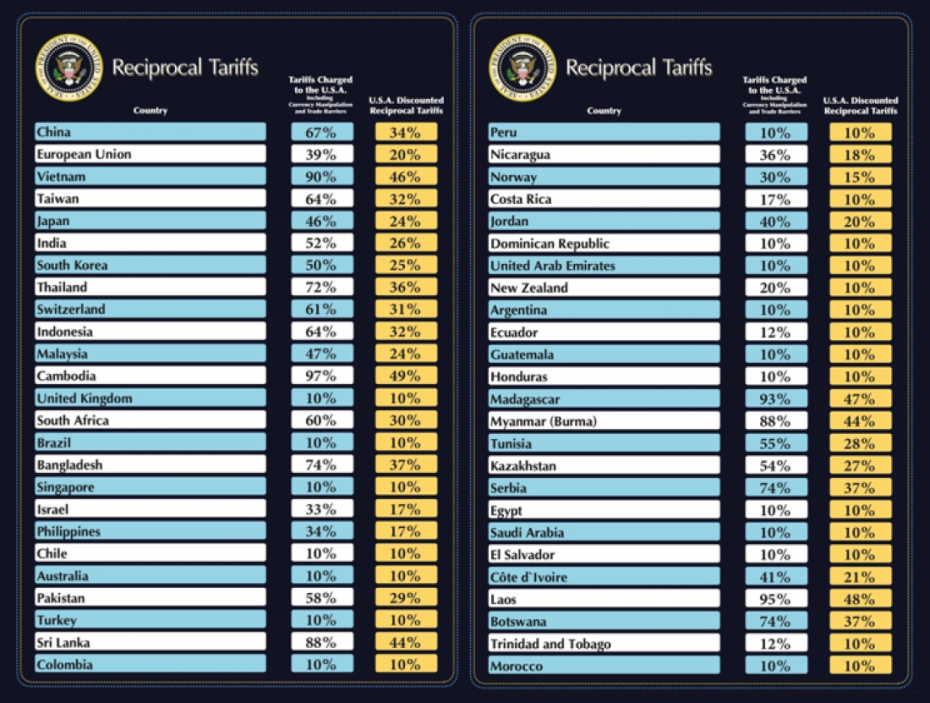UN agencies report 30,000 displaced in Lebanon shelters
At least 30,000 displaced people have sought protection in shelters across Lebanon following an escalation in h...
President Trump’s new tariffs hit 185 countries, with Kazakhstan facing the highest rate at 27%. Kazakhstan now seeks talks with U.S. officials to ease the impact.
On April 2, U.S. President Donald Trump imposed reciprocal tariffs on 185 countries, including all Central Asian nations. The most significant tariffs were levied on Kazakhstan, with a retaliatory 27 percent tariff, while other countries in the region face a 10 percent tariff.

The U.S. has justified these tariffs by claiming that Kazakhstan applies tariffs of up to 54% on American goods, though no further details or explanations have been provided on this figure. This has raised questions among Kazakhstani exporters, who are left uncertain about the basis for these claims.
Despite the rising tension over tariffs, the United States is not a major trading partner for the Central Asian countries, including Kazakhstan. In 2024, Kazakhstan's exports to the United States amounted to $1.97 billion, primarily in oil, uranium, ferroalloys, and silver. This accounted for just 2.4% of Kazakhstan's total exports. Meanwhile, Kazakhstan imported $2.24 billion worth of goods from the United States, representing 3.4% of its total imports.
The introduction of tariffs on Kazakhstani goods may present new economic challenges for the country. Economist Ruslan Sultanov observed that the move underscores the growing breakdown of the global trade system. "The WTO is losing credibility, and the rules of trade are no longer universal; they depend on political will," Sultanov stated. He emphasized that the Kazakh Ministry of Foreign Trade would need to engage in intensive negotiations with the U.S. to address the new trade conditions.
Kazakhstan currently has an average customs tariff rate of about 5%, according to the World Trade Organization (WTO). The Ministry of Trade of Kazakhstan has pointed out that 92% of its exports to the United States consist of crude oil, uranium, silver, ferroalloys, and other raw materials - items which are exempt from the new tariffs under Trump's decree. However, the Ministry noted that the new tariffs will affect approximately 4.8% of Kazakhstan's total exports to the U.S.
While the direct impact on trade volume might appear limited, the broader economic consequences could be more significant. Trump’s decree has already disrupted global markets, with oil pricesvital to Kazakhstan’s economy declining. The potential for inflationary pressure, caused by higher tariffs and price fluctuations, is a significant concern for Kazakhstan’s economy, which relies heavily on oil exports.
In response to the tariffs, Kazakhstan plans to consult with U.S. authorities to explore the possibility of tariff exemptions or reductions. These discussions will be crucial in mitigating any negative impacts on Kazakhstan’s economy.
The Kremlin is utilising the recent United States and Israeli military strikes on Iran to validate its ongoing war in Ukraine. Russian officials are pointing to the escalation in the Middle East as evidence that Western nations do not adhere to international rules.
Saudi Arabia’s state oil giant Saudi Aramco closed its Ras Tanura refinery on Monday following an Iranian drone strike, an industry source told Reuters as Tehran retaliated across the Gulf after a U.S.-Israeli attack on Iranian targets over the weekend.
U.S. President Donald Trump said the U.S. military has enough stockpiled weapons to fight wars "forever"; in a social media post late on Monday. The remarks came hours before conflict in Iran and the Middle East entered its fourth day.
China’s Foreign Minister Wang Yi has held talks with his Russian counterpart Sergei Lavrov following recent military strikes carried out by the United States and Israel on targets in Iran, as tensions in the Middle East continue to rise.
U.S. first lady, Melania Trump chaired a UN Security Council meeting on children and education in conflict on Monday (2 March), a move criticised by Iran as hypocritical following U.S. and Israeli strikes that triggered a UN warning about risks to children.
Start your day informed with AnewZ Morning Brief. Here are the top news stories for the 4th of February, covering the latest developments you need to know.
Strikes across the Middle East are intensifying, fuelling travel disruption, driving up global energy prices and forcing diplomatic missions to shut their doors.
U.S. President Donald Trump has said the United States has a “virtually unlimited supply” of munitions and is capable of sustaining military action indefinitely, as the conflict with Iran entered its fourth day.
The United Nations has called for an investigation into a deadly attack on a girls’ primary school in Iran, which Iranian officials say has killed more than 100 children. The U.S. has said its forces “would not” deliberately target a school.
U.S. first lady, Melania Trump chaired a UN Security Council meeting on children and education in conflict on Monday (2 March), a move criticised by Iran as hypocritical following U.S. and Israeli strikes that triggered a UN warning about risks to children.
You can download the AnewZ application from Play Store and the App Store.

What is your opinion on this topic?
Leave the first comment